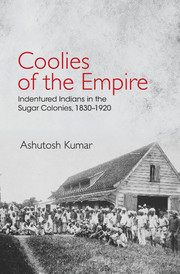Book contents
- Frontmatter
- Dedication
- Contents
- List of Figures and Maps
- List of Tables
- Preface
- Abbreviations
- Maps
- 1 Introduction: Indentured Emigrants in the Literature
- 2 Naukari, Network and Indenture
- 3 Regulating Indenture
- 4 The Journey
- 5 Agriculture and Culture between Two Worlds
- 6 Writing the Girmitiya Experience
- 7 The End of the Indenture System
- 8 Conclusion
- Appendices
- Glossary
- Bibliography
- Index
3 - Regulating Indenture
Published online by Cambridge University Press: 28 February 2018
- Frontmatter
- Dedication
- Contents
- List of Figures and Maps
- List of Tables
- Preface
- Abbreviations
- Maps
- 1 Introduction: Indentured Emigrants in the Literature
- 2 Naukari, Network and Indenture
- 3 Regulating Indenture
- 4 The Journey
- 5 Agriculture and Culture between Two Worlds
- 6 Writing the Girmitiya Experience
- 7 The End of the Indenture System
- 8 Conclusion
- Appendices
- Glossary
- Bibliography
- Index
Summary
Introduction
This chapter seeks to engage with the legal enactments and regulations on the issue of emigration and laws relating to it at the point of origin in India. Emigration-related legislation, regulation and enquiry reports are the main sources I take up here to lay bare the legal discourse on indentured emigration from India to the sugar colonies. One of the central debates among historians over the indenture system has been the level of ‘freedom’ or ‘unfreedom’ involved in emigration legislation. It has been frequently argued that legislation provided no opportunity for the signatory to breach contract after signing. Therefore, in legislating on emigration, the colonial government did not follow the role of ‘guardian’ or ‘benevolent neutrality’ at official level and instead favoured planters with coercive labour legislation. In looking into the making of emigration legislation, this chapter especially engages with some of the clauses, which provide shadows of ‘unfreedom’, and seeks to understand why the nature of the indenture contract was a penal contract than a civil contract. With some examples of emigration legislation, how indenture law became a check against deception by recruiters is shown.
Historiography of Labour Legislations
Hugh Tinker, without looking deeply into the indenture legislations, argued that the laws of indenture imitated the Master and Servants Acts of Britain, where any breach of contract was a crime. Hence, once a prospective emigrant signed the contract, he/she came under a criminal procedure code under which breach of contract resulted in punishment. In other words, ‘unfreedom’ was a basic characteristic of the indenture contract, which put all workers into a condition of slavery. Following Tinker, many other scholars have also presented the argument of ‘legal coercion of Empire’ in the context of indenture, as well as in other workmen contracts. Legal historians such as Willy Forbath, Amy Stanley and Christopher Tomlins have pointed out that the labour laws of the nineteenth century increased the subordination of wage workers, imposed harsh terms on poor relief and provided no legal redress for workplace accidents.
- Type
- Chapter
- Information
- Coolies of the EmpireIndentured Indians in the Sugar Colonies, 1830–1920, pp. 55 - 75Publisher: Cambridge University PressPrint publication year: 2017



